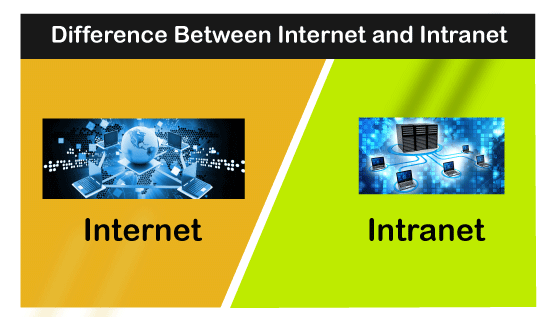Difference between Internet and IntranetAlmost everyone is using the Internet in this technological era. But when it comes to distinguishing the Internet and the Intranet, most people get confused because both the terms seem almost similar in words. Although there is just a difference of one alphabet in their terms, they have many noticeable differences in general. 
In this article, we are discussing the significant differences between the Internet and the Intranet, which will help understand the requirements of both. This will also help us decide which one of them we need for personal use and commercial use. Let's first understand both with the definitions: What is the Internet?The Internet is a global network that uses TCP / IP protocols to connect millions of computers worldwide. It can include different networks, such as private, public, organizational, academic, government, etc. It allows users to communicate with each other and share massive amounts of data in various formats. Internet is available in both modes, wired and wireless. In wired mode, the data travels through fiber optic cables, whereas in wireless mode, the data travels through radio waves. Some of the essential applications of the Internet are listed below:
How does the Internet work?The internet is a network created by connecting a large number of computers or computer networks. It is a type of network that cannot be owned by an entity. It is formed using networks of networks configured using complex standards and rules (such as protocols). The Internet works through a packet routing network following the protocols, where the packet routing is the technique of routing data packets from source computer to a destination computer. However, there are several protocols; the transmission and internet protocols are the primary impelling agents that help build the Internet network. The other common protocols used by the connected networks are HTTP, FTP, and SMTP. Besides, the protocols and applications like Telnet, Gopher, WWW, Usenet News, Internet Relay Chat, etc. are also used throughout the working of the Internet. Advantages of InternetFew advantages of the Internet are listed below:
What is Intranet?An Intranet is a part of the Internet and is owned and used privately by an organization. It is mainly used to connect all the computers and establish a private network of an organization to provide employees the ability to collaborate on projects, manage or update information, share calendars, and to-do list, etc. Organizations prefer using Intranet to keep their data inaccessible from outsiders, making their suspicious data and project information secure. Intranet includes a firewall to prevent unauthorized users from accessing the network. The websites created over Intranet look almost similar and act like any other website on the Internet. However, these websites are much more task-oriented than promotional design websites on the Internet. Like the Internet, the intranet's websites can also provide the interface to form communication in the shape of chatting, image sharing, audio-video conferencing, etc. All these activities can only be used by authorized users who have permission to access the Intranet network. Some other essential applications of the Intranet are listed below:
How does Intranet work?Intranet usually runs in a client/server environment where the computers are connected using local area networks. Each computer is identified by the MAC address or an IP address, which remains unique for every computer. As an Internet, the Intranet also uses the client-server model based on the TCP / IP protocol suite. Because web browsers do not depend on the platform, they are also used on Intranet to access and retrieve information from the server within the organization. Besides, there is no need to install any special kind of software on the systems on the Intranet. But most companies use customized software designed purposely for company-specific tasks. In addition to the protocols, Intranet uses a firewall to filter unwanted elements to the network and protects it from external intruders. It also includes network connectivity and the public telecommunication system, which help access and share the company's data, projects, and operations securely with the staff. Advantages of IntranetFew advantages of the Intranet are listed below:
Key Differences between Internet and IntranetFew key differences between the Internet and the Intranet are listed below:
Major Differences between Internet and IntranetThe other major differences between the Internet and the Intranet can be explained in a tabulated form, as below:
Next TopicDifference between
|
 For Videos Join Our Youtube Channel: Join Now
For Videos Join Our Youtube Channel: Join Now
Feedback
- Send your Feedback to [email protected]
Help Others, Please Share










